Ex-Black Cap Geoff Allott has seen huge changes in India in the decade he has been doing business there.
With over a decade’s experience exporting to and working in India, ex-Black Caps cricketer Geoff Allott has some good insights into how far and how fast the rapidly developing market has come in that time.
Allott is managing director and founder of QualityNZ, a New Zealand-based company now accounting for 85% of all sheepmeat imported into India (see accompanying article).
He said the single biggest shift from a consumer’s perspective is the rollout of bank accounts for all Indian households, coinciding with the launch of Aadhaar, a national identity card for every Indian citizen.
Allott is adamant greater communication and education back home in NZ about India’s potential is vital in a country where China has tended to dominate the export horizon.
“What we have seen, even in the last 12 months, has been a real momentum building here,” he said.
Stable government and clearly defined policies to achieve growth are leveraging quickly off India’s natural demographic advantage of having a younger population, where 65% are 35 or younger.
Policies and demographics are combining to generate a growing middle class that promises to expand from about 400 million today to over 700 million by 2030.
In a country where agriculture continues to employ about 40% of the population but account for only 12% of its income, the government is working to urbanise more workers into higher paying manufacturing and tech jobs, pulling those millions out of subsistence poverty.
The requirement for citizens to have bank accounts has resulted in near complete saturation of household access to accounts.
“This was helped along by the government getting rid of certain denominations and offering cash for your account. There was also a variable GST rate bought in, depending upon the product, and it ranges from 5% to 30%.”
The national ID card is linked to the bank account, and from here the government has been able to implement policies like subsidised LPG, mobile phone network rollout and vehicle licensing.
In the decade Allott has been in business the improvements in the average Indian’s quality of life as been definitive.
Census data records access to electricity increasing from 66% in 2011 to 90% in 2021, tap water up from 26% to 64%, and toilets from 46% to 64%.
Over half the population have two wheelers for transport.
Prime Minister Narendra Modi, gearing up for his third election term on the wave of strong popularity, is calling for the nation to double down on all government schemes to support greater development and wealth improvements.
“They have achieved in five years what has taken many 20 years to do,” Allott said.
• Richard Rennie travelled to Delhi with the India-NZ Business Council trade delegation, with funding from Asia New Zealand Foundation and Zespri.
